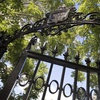{shortcode-b686964638a673961a3ab82070f1cbbf8a57b848}
An effort to open debate on whether Harvard’s Faculty of Arts and Sciences should condemn President Donald Trump’s threats to academic freedom failed at a Tuesday faculty meeting, falling short of the 80 percent threshold needed to discuss the motion.
The motion — which was introduced by Government professor Ryan D. Enos — would have opened the floor for faculty to discuss establishing an official FAS stance against Trump’s threats to pull federal funding.
“Be it resolved that the Faculty of Arts and Sciences strongly condemns the actions by the Trump administration that threaten academic freedom at Harvard and other universities and urges, in the strongest terms, that Harvard leadership oppose these unlawful actions,” the resolution read.
Enos’ motion came after more than an hour of intense discussion about Trump’s threats to funding and international students. It seemed to receive support from the majority of the room. But when the votes were tallied via clicker, those in favor fell short of the steep threshold required to advance a motion.
The failure to approve the motion could have reflected exhaustion as the Tuesday meeting dragged on — or be a sign that some faculty lack the appetite to confront the White House in a moment when doing so could draw even more unwanted attention to Harvard.
Enos brought the motion forward one day after the Trump administration announced a review of more than $8 billion in grant commitments to Harvard as part of an ongoing investigation by its task force on antisemitism. Columbia University received a similar letter stating that its federal grants were under review just days before the Trump administration took an axe to $400 million of Columbia’s federal funding.
Columbia’s decision to concede to several of the task force’s demands drew outrage from many academics, including at Harvard, where more than 600 faculty signed a letter urging the University’s governing boards to defend Harvard’s independence.
“The Trump administration has nicely put a number on what compliance costs: $8 billion. That’s a big freaking number,” Sociology professor Jocelyn Viterna said at the Tuesday meeting. “But we are not calculating the cost of letting a political administration shape academic work.”
As Enos introduced the motion, he drew a connection between the recent dismissals of two leaders at Harvard’s Center for Middle Eastern Studies and Columbia’s decision to place several regional studies programs under a vice provost’s leadership.
“It seems like Harvard is doing exactly what is demanded by our critics, and almost exactly what was demanded by the Trump administration of Columbia,” Enos said.
But Government department chair Daniel P. Carpenter said his colleagues’ condemnations of the dismissals at CMES relied on the assumption that the FAS should not have made the changes in the first place. He said that regardless of the political environment, administrators are justified in taking action to promote intellectual diversity — and doing so is not “ipso facto” evidence of caving to pressure from Washington.
While academic freedom protects faculty’s “core offices” as professors, it does not guarantee any leadership positions they may hold, Carpenter added.
“It does not protect a professor’s right to be dean, it does not protect my right to be department chair, and it does not protect a professor’s right to lead a center or a program,” he said.
Enos did not introduce his anti-Trump motion to the Faculty Council prior to Tuesday’s meeting, instead bringing it directly to the full FAS. Any voting member of the faculty can bring up an item of business during the meeting, and the item will be discussed if there is four-fifths approval to open debate.
When Hoekstra asked Enos why he had not presented the proposal through regular proceedings, Enos said Trump’s actions required an urgent response.
But Enos and the resolution’s supporters will have to wait. The issue will now go to the Faculty Council’s docket committee, which will decide whether the FAS will debate it at a later date.
—Staff writer William C. Mao can be reached at william.mao@thecrimson.com. Follow him on X @williamcmao.
—Staff writer Veronica H. Paulus can be reached at veronica.paulus@thecrimson.com. Follow her on X @VeronicaHPaulus.
Read more in Faculty News
Harvard FAS Is Developing a Contingency Plan for Drastic Federal Funding Cuts












